World
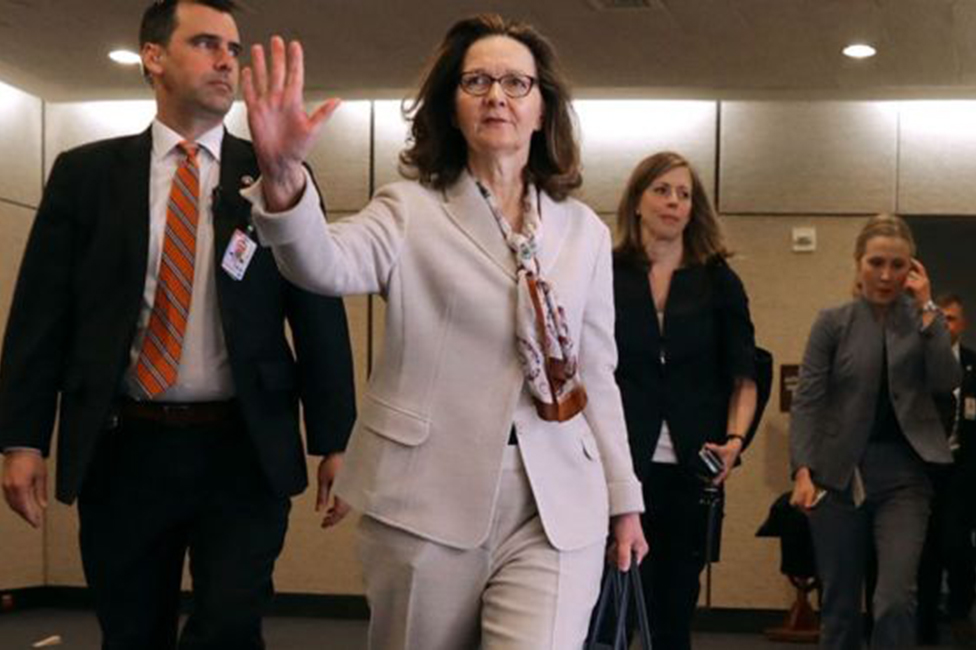
Gina Haspel confirmed as CIA's first female director
The US Senate has approved the CIA's first female director, despite her role in the spy agency's post-9/11 interrogation programme.
Gina Haspel's confirmation in a 54-45 vote follows a partisan fight among senators about the CIA's Bush-era use of techniques such as waterboarding.
Ms Haspel, a CIA veteran, once oversaw a so-called black site in Thailand after the 11 September 2001 attacks.
The former CIA chief, Mike Pompeo, left to become US Secretary of State.
Republican Senator John McCain - who was tortured during his more than five years in a Vietnamese prison - had earlier announced his opposition to US President Donald Trump's nominee.
On Thursday, six Democrats crossed party lines to vote in her favour.
One of them, Virginia Senator Mark Warner, said Ms Haspel had told him the agency should never have resorted to so-called enhanced interrogation techniques.
He said she had pledged never to use such methods even if the president demanded it.
A 33-year veteran of the agency, Ms Haspel, 61, spent most of her career as an undercover operative.
In 2002, she was selected by the agency to run a "black site" in Thailand where harsh interrogation techniques were used that a Senate report deemed to be torture.
One suspect that was brought there, Abd al-Rahim al-Nashiri, was brutalised using methods that were later banned by President Barack Obama.
Al-Nashiri, who was interrogated after Ms Haspel took over the post, was also subjected to sleep deprivation, nudity, extreme temperatures, being held in a small box, and "walling" (being slammed repeatedly into a wall).
Three years later, Ms Haspel ordered the destruction of 92 video tapes that documented the interrogation of him, and Abu Zubaydah, who was also held at the Thai location.
At least 119 men were tortured by the US in the aftermath of the attacks on the World Trade Center and Pentagon, according to a 2014 Senate report.
Human rights groups say Ms Haspel left Thailand to oversee further US torture, but it is unclear what role she played as her exact record has been classified by the CIA.
Mr Trump has previously called for the US to resume waterboarding terrorism suspects.
Source : BBC
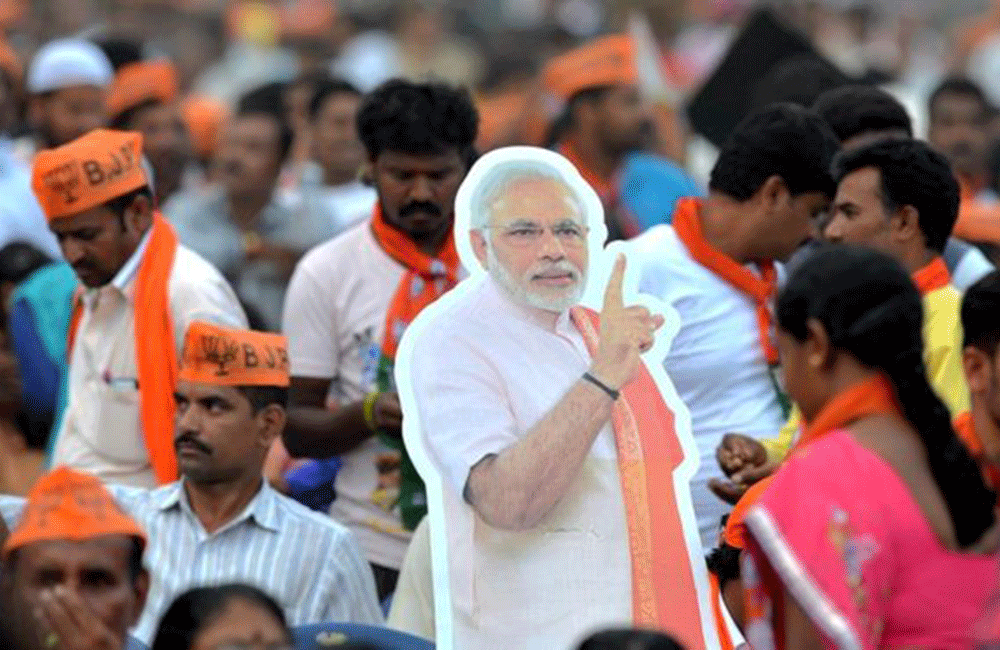
India's ruling BJP leads in Karnataka state poll
India's ruling Bharatiya Janata Party (BJP) of PM Narendra Modi is expected to win the most seats in the southern Karnataka state, exit polls suggest.
But they say it will fall short of winning a majority in the 224-member assembly. The opposition Congress party, which until Saturday's election controlled the state, is in second place.
The poll is significant for both of India's major parties ahead of general elections next year.
More than 49 million people were eligible to vote in Karnataka - the last major bastion of the Congress party. Karnataka is the hub of India's information technology industry and has a population of 64 million.
The official results of the election will be announced on 15 May.
Source : BBC
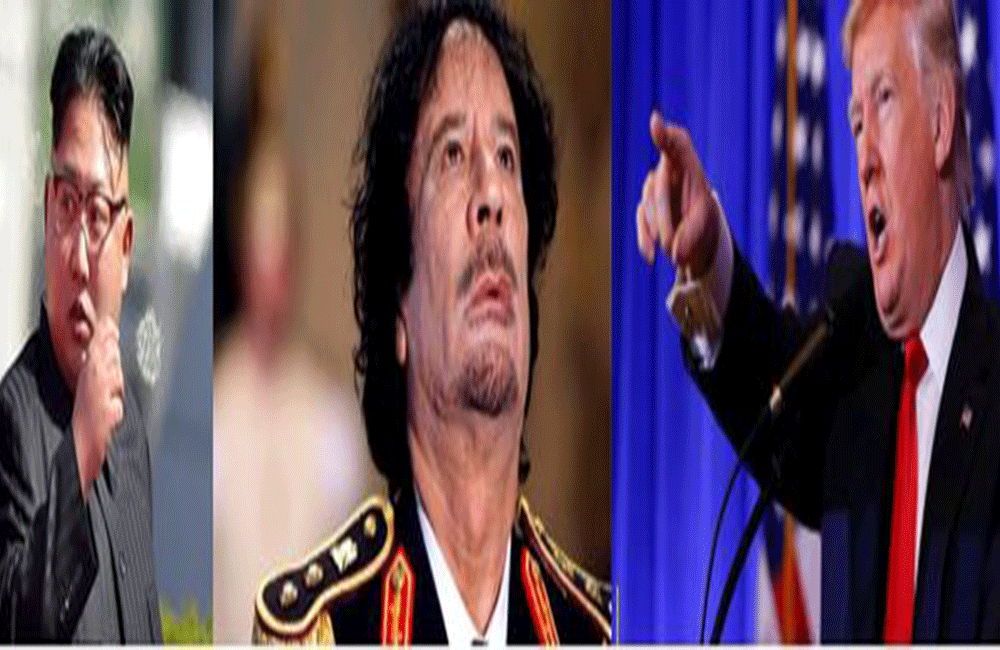
Donald Trump's warning to Kim Jong-un: make a deal or suffer same fate as Gaddafi
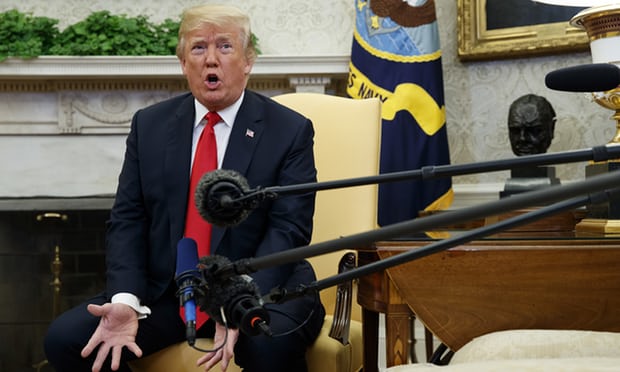
Trump at the White House on Wednesday. The ‘Libya model’ John Bolton was referring to was Gaddafi’s agreement to surrender his nuclear weapons in 2003. Photograph: Evan Vucci/AP
Donald Trump has threatened Kim Jong-un with the same fate as Muammar Gaddafi if the North Korean leader “doesn’t make a deal” on his nuclear weapons programme.
The US president issued the threat at the White House when he was asked about the recent suggestion by his national security adviser, John Bolton, that the “Libyan model” be a template for dealing with North Korea at a summit between Trump and Kim planned for 12 June in Singapore.
The model Bolton was referring to was Gaddafi’s agreement in December 2003 to surrender his embryonic nuclear weapons programme, which included allowing his uranium centrifuges to be shipped out to the US.
But Trump appeared to be unaware of that agreement, and interpreted the “Libyan model” to mean the 2011 Nato intervention in Libya in support of an insurrection, which ultimately led to Gaddafi’s murder at the hands of rebels in Tripoli. “The model, if you look at that model with Gaddafi, that was a total decimation. We went in there to beat him. Now that model would take place if we don’t make a deal, most likely. But if we make a deal, I think Kim Jong-un is going to be very, very happy,” Trump said, suggesting that the regime’s survival could be assured if Kim agreed to disarm.
“This with Kim Jong-un would be something where he would be there. He would be running his country. His country would be very rich,” the president said.
“We’re willing to do a lot, and he’s willing … to do a lot also, and I think we’ll actually have a good relationship, assuming we have the meeting and assuming something comes of it. And he’ll get protections that will be very strong.”
Asked whether his comments meant that he disagreed with his national security adviser, the third of his administration, the president said: “I think when John Bolton made that statement, he was talking about if we are going to be having a problem, because we cannot let that country have nukes. We just can’t do it.”
Joel Wit, a former US negotiator who is now a senior fellow at the US-Korea Institute at Johns Hopkins University, said: “This is probably the wrong time to be making threats, three weeks before the summit.”
The inflammatory comments come at a time when the June meeting is in doubt. The regime in Pyongyang reacted strongly against statements by Bolton over the weekend, who insisted North Korea would have to dismantle its nuclear arsenal completely and immediately. A senior official said on Wednesday that Kim would not take part in a summit with such “one-sided” goals.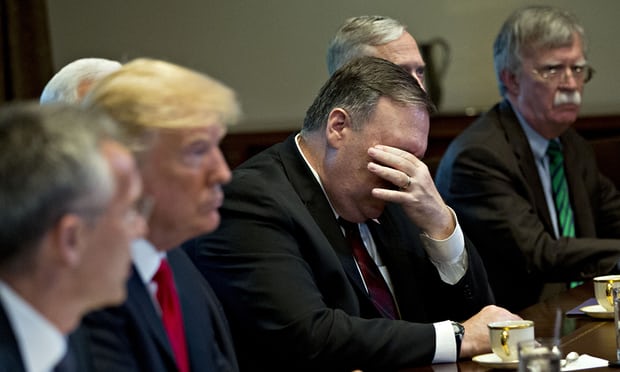
Trump in a White House meeting with Mike Pompeo (middle), John Bolton, (far right) and the Nato chief Jens Stoltenberg (far left). Photograph: Pool/Getty Images
Pyongyang has also complained about joint military exercises being conducted by US and South Korean forces. The regime’s mission to the United Nations issued a statement on Thursday claiming that nuclear-capable B-52 bombers and F-22 fighter planes were taking part in the exercises. He described it as “an extremely provocative and ill-boding act”.
However, Trump said that despite Pyongyang’s threats to call off the summit, “they’ve been negotiating like nothing happened”.
The state department spokeswoman, Heather Nauert, said: “We are continuing to push ahead and plan our preparations. Those continue at this time for a meeting between the president and Kim Jong-un in June.”
At a meeting in Tokyo on Tuesday, a senior state department official suggested that a substantial but partial disarmament by North Korea might be acceptable as the first stage of a deal with North Korea.
Speaking to a meeting of business executives in Tokyo organised by the Wall Street Journal, Susan Thornton, the acting assistant secretary of state for East Asia and Pacific Affairs, said that in Kim’s conversations with South Korean officials, he had said “there will be a big downpayment, a big up-front demonstration of his intention” to dismantle the North Korean nuclear weapons programme completely.
“The question is: what could be front-loaded in a process that’s inevitably going to go on for some time? And then what would be acceptable to the North Korean side in return for that front-loading?” Thornton said.
(The Guardian)

Oil prices risk spiking to $100: Bank of America
Oil prices look set to temporarily hit $90 a barrel during the first half of next year, if not sooner, and risk spiking to as much as $100 a barrel, depending on geopolitical events and other factors, say Bank of America Merrill Lynch analysts.
But they do not see an immediate major jump in prices. For this year, they forecast an average price of $70 a barrel for Brent crude, the international benchmark. They forecast $75 for next year. Their previous forecast was $60.
Prices could climb significantly next year, however. The analysts have a target of $90 a barrel during the second quarter of 2019, with a risk it could go to $100 a barrel. Futures on Brent were trading as high as $78 Thursday.
"Looking into the next 18 months, we expect global oil supply and demand balances to tighten driven by the ongoing collapse in Venezuelan output. In addition, there are downside risks to Iranian crude oil exports. Plus we see a high likelihood of OPEC working with Russia in 2019 to set a floor on oil prices," they wrote.  The report says OPEC and Russia could gradually reduce the amount of oil they are holding off the market by 450,000 barrels a day next year. But if they do not step back from their current agreement to withhold 1.8 million barrels a day, the market will get tighter and prices will be higher.
The report says OPEC and Russia could gradually reduce the amount of oil they are holding off the market by 450,000 barrels a day next year. But if they do not step back from their current agreement to withhold 1.8 million barrels a day, the market will get tighter and prices will be higher.
They also expect Venezuela's output to drop by 500,000 barrels a day over the next 20 months, but they did not include a major drop in Iranian exports in their forecast. If a new nuclear deal is not reached within six months, global oil markets could tighten further. They factored in Iran's current production of about 3.8 million barrels a day.
As for the U.S., they forecast West Texas Intermediate crude prices will be about $5 below Brent this year and $6 below next year, due to bottlenecks in transporting shale crude to market and because of capital constraints at drillers. WTI was trading just above $71 a barrel on Thursday.
Infrastructure limitations in the U.S., such as the lack of pipeline capacity, means shale drillers may not ramp up as much production as they otherwise might. The analysts expect some of those issues involving long-haul pipelines to be solved in the second half of 2019. They also see U.S. drilling constrained by pressure on companies to exercise capital discipline in the face of rising costs.
World oil consumption should grow by 1.5 million barrels a day this year and 1.4 million barrels a day next year.
OPEC and Russia cut back on output beginning in 2016 because of a massive supply glut. Bank of America now sees a deficit of 630,000 barrels a day this year and 300,000 next year. They expect that will drive down OECD oil stocks below their five-year average, a metric watched by OPEC and Russia as they monitor the progress of their production agreement to balance supply and support prices.
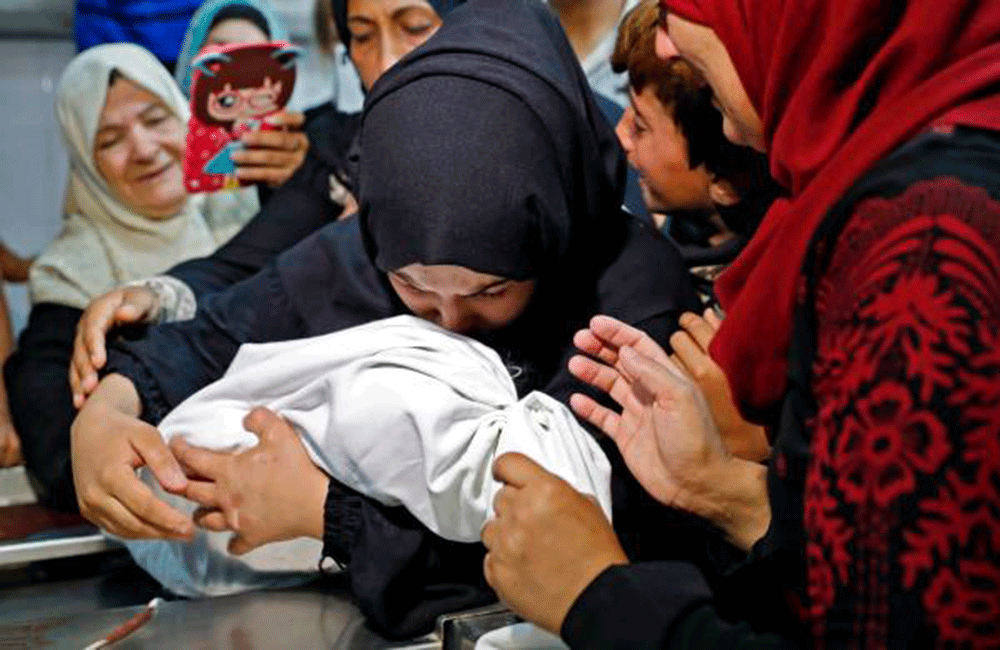
Tension in Gaza as Palestinians begin to bury 58 dead
Funerals are being held in Gaza for 58 people killed on Monday when Israeli troops opened fire during Palestinian protests, in the deadliest day of violence there since a war in 2014.
The burials coincide with the 70th anniversary of what Palestinians call the Nakba - a mass displacement of Palestinians after Israel's creation.
Israel's military said it was preparing for further confrontations on Tuesday.
But Palestinian groups indicated they intended to rein in the protests.
Monday's violence came as the US inaugurated its first embassy in Jerusalem, a controversial move that broke with decades of US policy and incensed Palestinians.
Palestinians claim East Jerusalem as the capital of a future Palestinian state and see the US move as backing Israeli control over the whole of the city - which Israel regards as its indivisible capital.
Palestinian officials said that, as well as those killed, about 2,700 people had been injured in Monday's violence - which they condemned as a massacre.
Israeli Prime Minister Benjamin Netanyahu said his military was acting in self-defence against Gaza's Islamist rulers, Hamas, who seek to destroy Israel. Israel's military said it had only fired at "targets of terrorist activity".
The UN human rights office was heavily critical of Israel's use of force.
Source : BBC
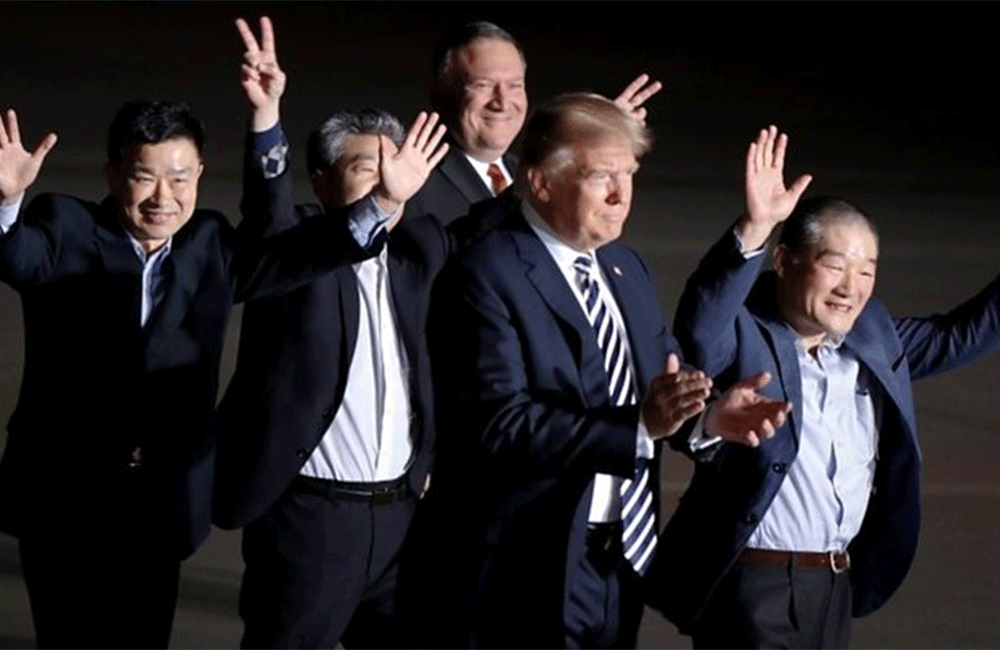
Trump welcomes US detainees freed by North Korea
US President Donald Trump has welcomed home three American detainees released by North Korea.
Trump said it was a "special night for these really great people" as they arrived at the Andrews Air Force Base near Washington.
The White House said the trio had been freed as a gesture of goodwill ahead of the planned meeting between Trump and North Korean leader Kim Jong-un.
Trump says the venue for the summit will be announced: "within three days".
The president said he appreciated that Kim had allowed the men to leave as "frankly we didn't think that was going to happen before the meeting". The three men, Kim Hak-song, Tony Kim and Kim Dong-chul, were smiling and waving and appeared in good health.
They said little in an impromptu chat before the media with Trump but released an earlier statement saying: "We would like to express our deep appreciation to the United States government, President Trump, Secretary [of State Mike] Pompeo and the people of the United States for bringing us home.
Source : BBC

Former Indian Minister charged with abetting wife’s suicide
A top rung Congress party leader and former Indian minister, Shashi Tharoor, has been charged with abetting the suicide of his wife Sunanda Pushkar in 2014. Tharoor has also been charged with cruelty in his marriage.
But Tharoor described the 3000-page charge sheet as “unbelievable”. The Congress party spokesman said that it is the BJP’s conspiracy to defame Tharoor and that it is nothing but the ruling party’s “revenge machine at work.”
Sunanda (51) was found dead in a suite of a five-star hotel in south Delhi on January 17, 2014, days after she publicly accused her husband of having an affair with Meher Tarar, a well-known Pakistani journalist and one of the editors of Daily Times based in Lahore.
Tharoor reacted to the filing of the charge sheet by the Delhi Police, in two tweets, Tharoor said: “I have taken note of the filing of this preposterous charge sheet and intend to contest it vigorously. No one who knew Sunanda believes she would ever have committed suicide, let alone abetment on my part. If this is conclusion arrived at after 4+ yrs of the investigation it does not speak well of the methods or motivations of the Delhi Police. In oct 17, the Law Office made a statement in the Delhi High Court that they have not found anything against anyone and now in 6 months they say that I have abetted a suicide. unbelievable!”
While addressing the media, Congress spokesperson Randeep Singh Surjewala said: “We won’t cow down or bow down. This is a conspiracy to defame Shashi Tharoor. We reject the charges totally. This is being done on instructions from the BJP and Narendra Modi-led government. BJP’s revenge factory is at work”.
Police first claimed that Sunanda was poisoned, and registered a murder case in January 2015, without naming any suspect.
The Congress minister of state for Human Resource Development and MP from Thiruvananthapuram married the Dubai-based entrepreneur in August 2010.
Source : Newsin.asia
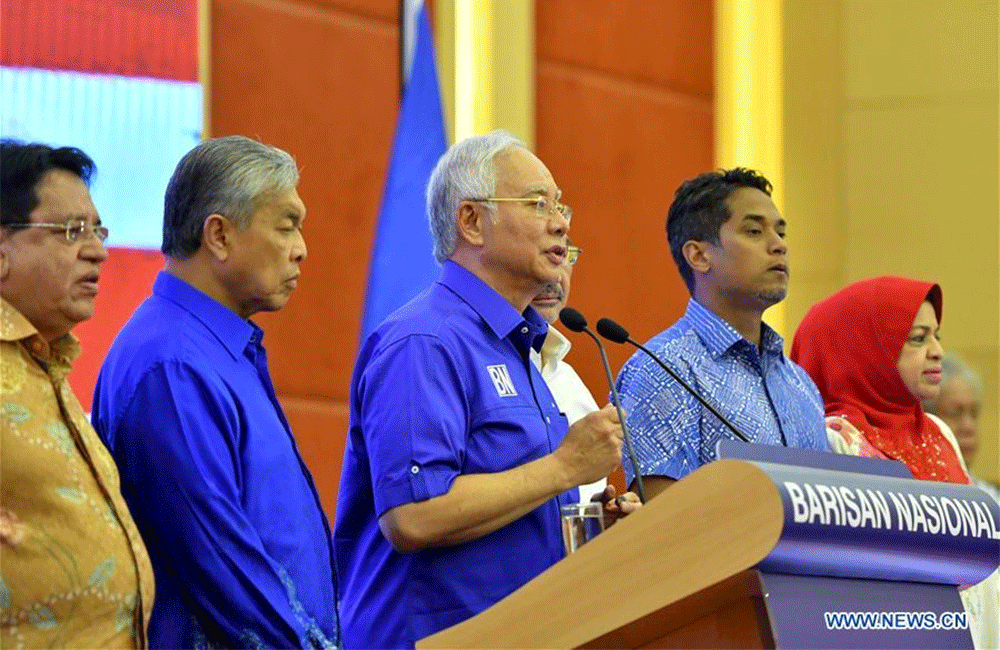
Malaysia's ruling coalition chairman Najib accepts general election result
Najib Razak, chairman of Malaysia's ruling coalition Barisan Nasional and the prime minister since 2009, said Thursday that he accepted the result of the general election, which saw his coalition lose to the opposition led by former Prime Minister Mahathir Mohamad.
"I accept the verdict of the people," said Najib, without conceding defeat outright.
The opposition Pakatan Harapan and its allies won a simple majority in the lower house of parliament on Wednesday's election, potentially putting an end to BN's rule for more than 60 years.
However, Pakatan Harapan and its allies were not contending under one united banner like BN, so Najib said that since no party won a simple majority, it will be up to the ceremonial Supreme Head of State to make the decision to appoint the new prime minister.
Source : Xhinua
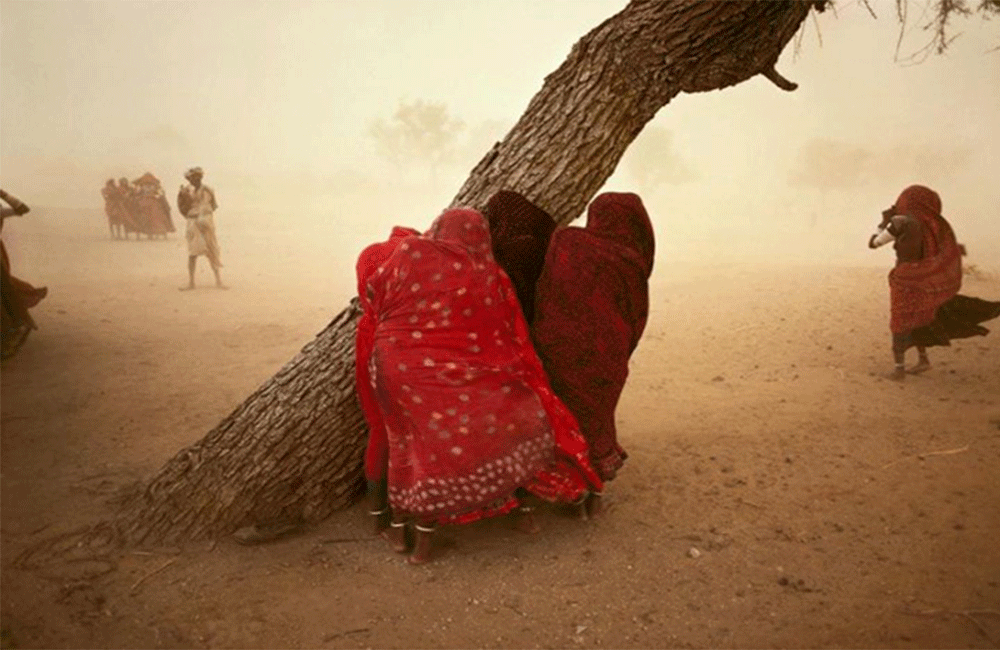
India dust storms: At least 61 dead in four states
At least 61 people have died in fierce dust storms across four Indian states since Sunday evening, with officials warning of more bad weather to come.
High-speed winds and lightning devastated many villages, bringing down homes and leaving dozens injured.
The northern state of Uttar Pradesh reported the highest death toll - 38. More than 70 people had died in dust storms in the state earlier in May.
According to officials casualties could go up further.
Twelve people were reported dead in the southern state of Andhra Pradesh, which was also severely hit by the storms. Nine people were killed in the eastern state of West Bengal, while two people have been confirmed dead in Delhi.
All four states remain on high alert as officials warn of more thunderstorms over the next few days.
India's Meteorological Department had issued a warning on Sunday before the storms hit, warning people to stay within their homes. Wind speeds were around 109 km/h (67mph) accompanied by thunder and lightning, officials said.
Air travel in Delhi was also affected, with around 70 flights being diverted from the city's international airport on Sunday night.
Prime Minister Narendra Modi said on Twitter that he "prayed" for the speedy recovery of those who were injured and he asked officials to provide assistance.
Large parts of India have been struck by deadly storms in the past month. More than a 100 people died in northern India on 4 May due to intense dust storms and heavy rains.
Authorities at the time said they were shocked by the ferocity of the storms, adding that it was one of the worst they had seen.
Source : BBC
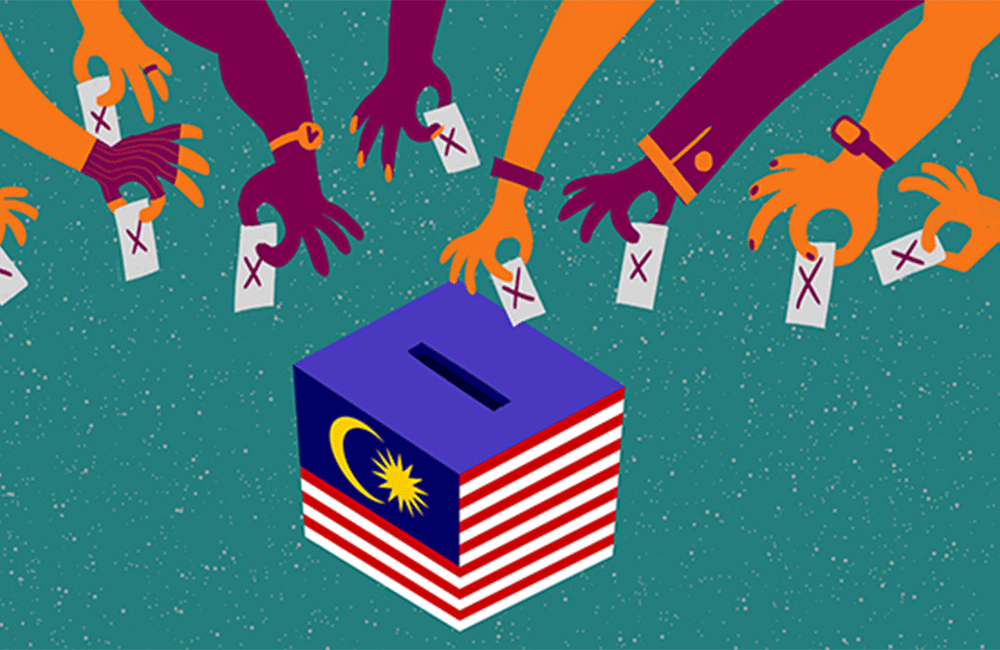
Malaysia heads to polls on election day
Millions of voters in Malaysia are heading to the polls in an election that will see the country's leader take on his 92-year-old former mentor.
Opposition leader Mahathir Mohamad will face off against PM Najib Razak's ruling Barisan Nasional (BN) coalition.
Such an opposition victory would be unprecedented in Malaysia, where BN has ruled for 61 years.
But critics have raised concerns the election will not be free and fair.
In the last election, in 2013, the opposition made unprecedented gains - winning the popular vote - but failed to win enough seats to form a government.
The government has insisted the election will be free and fair, with Mr Najib saying that the EC acted "for the good of all".
Voters will elect 222 members of parliament as well as state assembly members in 12 of the 13 states.
Malaysia uses a first-past-the-post electoral system, where the party that gets the most seats in parliament wins even if it does not win the popular vote.
Source : BBC
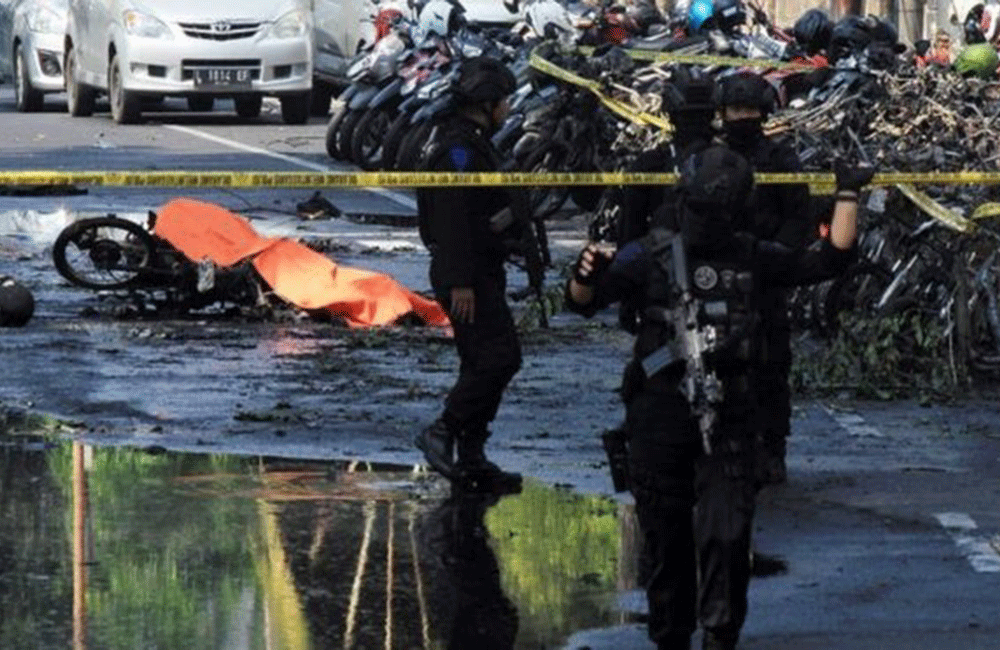
Nine dead in Indonesia church bombings
Suicide bombers have attacked three churches in Indonesia's second-largest city Surabaya, killing at least nine people, police say.
Dozens of others were injured in the attacks, which occurred within minutes of each other. No group has so far said it carried them out.
TV pictures showed debris scattered around the entrance of one church.
Indonesia, the most populous Muslim-majority country, has seen a resurgence of Islamist militancy in recent months.
The bombings took place around 07:30 local time (00:30 GMT)
The country's intelligence agency said it was most likely to have been carried out by an Islamic State-inspired group, Jemaah Ansharut Daulah.
Days earlier, five members of the Indonesian security forces were killed during a standoff with militant Islamist prisoners at a high-security prison on the outskirts of the capital Jakarta.
Source : BBC
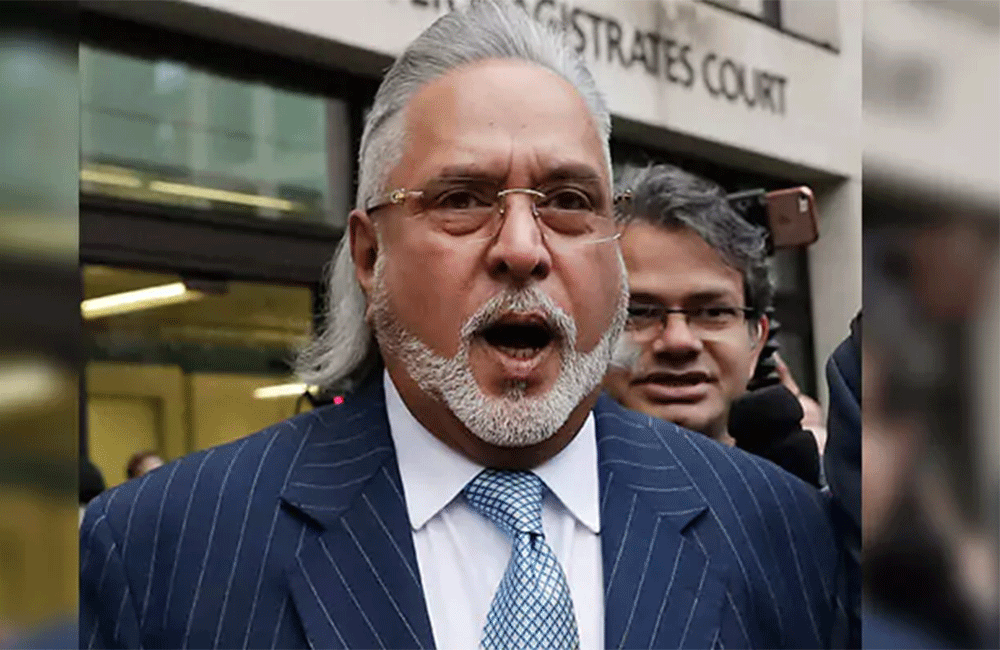
Business Tycoon Vijay Mallya Loses Case, Banks Can Sell His UK Assets To Recover Dues
Tycoon Vijay Mallya lost a U.K. lawsuit filed by Indian banks seeking to collect more than 1.15 billion pounds ($1.5 billion) amid allegations that he committed massive fraud.
Judge Andrew Henshaw in London on Tuesday said the lenders, including IDBI Bank Ltd., can enforce an Indian court ruling that relates to allegations that Mallya willfully defaulted on about $1.4 billion in debt for his now-defunct Kingfisher Airlines Ltd. Henshaw also refused to overturn a worldwide order freezing Mallya's assets.
The 62-year-old is fighting numerous lawsuits in the U.K. and his native country over fraud and money-laundering allegations. He was arrested in London more than a year ago and is waging another fight to block extradition in a different court about three miles across town.
Lawyers for Mallya declined to comment after the hearing. Henshaw refused permission to appeal Tuesday's ruling, meaning his attorneys will have to directly petition the Court of Appeal.
Attorneys at law firm TLT in London, who are representing the lenders said the ruling will allow them to enforce the underlying judgment by the Indian debt recovery tribunal immediately.
The asset freeze order had forced Mallya to live on 5,000 pounds a week, but his allowance was increased to roughly 20,000 pounds a week earlier this year, lawyers for the lenders said after the hearing.
Allegations
Mallya was arrested in London April 18 on a warrant issued by Indian authorities accusing him of conspiring to defraud India's IDBI Bank through a 91 billion-rupee ($1.4 billion) loan to Kingfisher Airlines Ltd. -- a premium airline he founded in 2005 and shut down seven years later.
Mallya left India in 2016, saying he was moving to England to be closer to his children. He has refused to return to India and said he fears an unfair trial amid the "media frenzy and hysteria" over unpaid dues. Mallya has also said government agencies are pursuing a "heavily biased investigation" and holding him guilty without trial.
Source : NDTV
Page 25 of 41